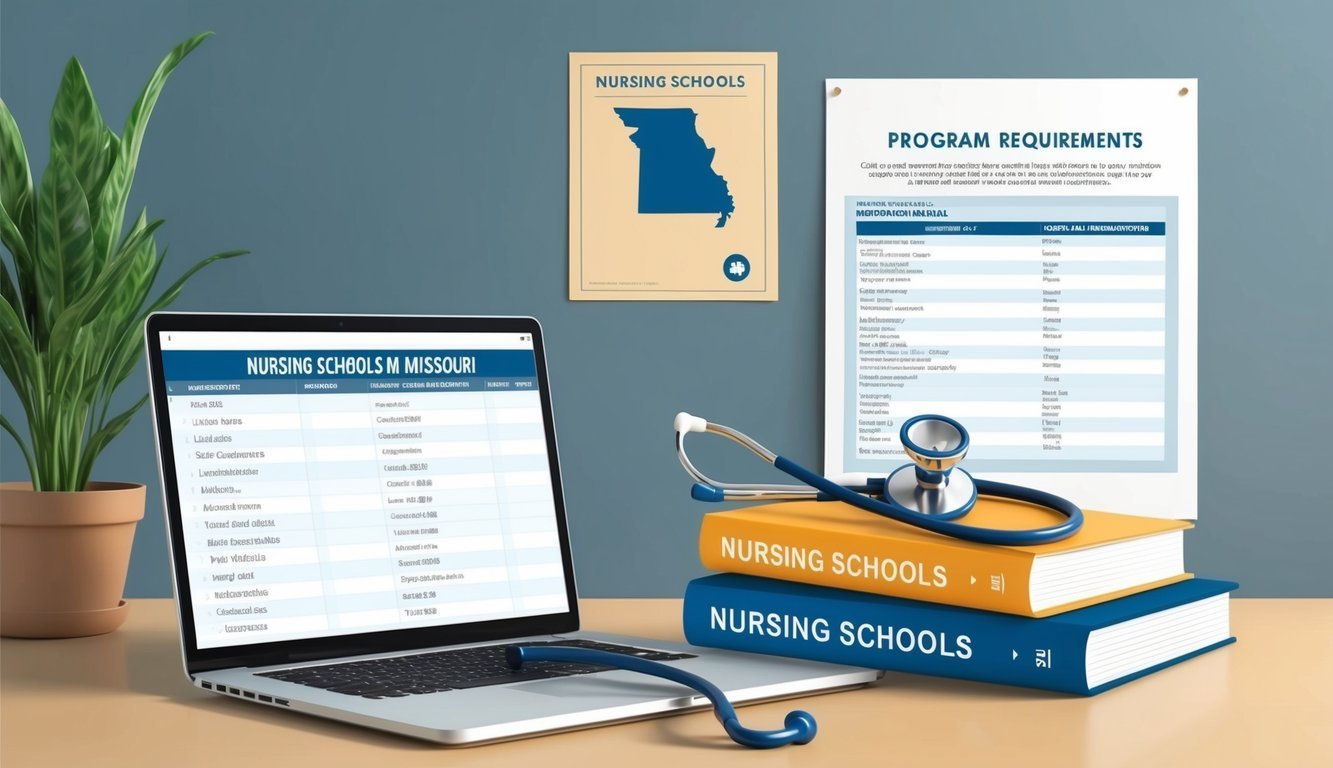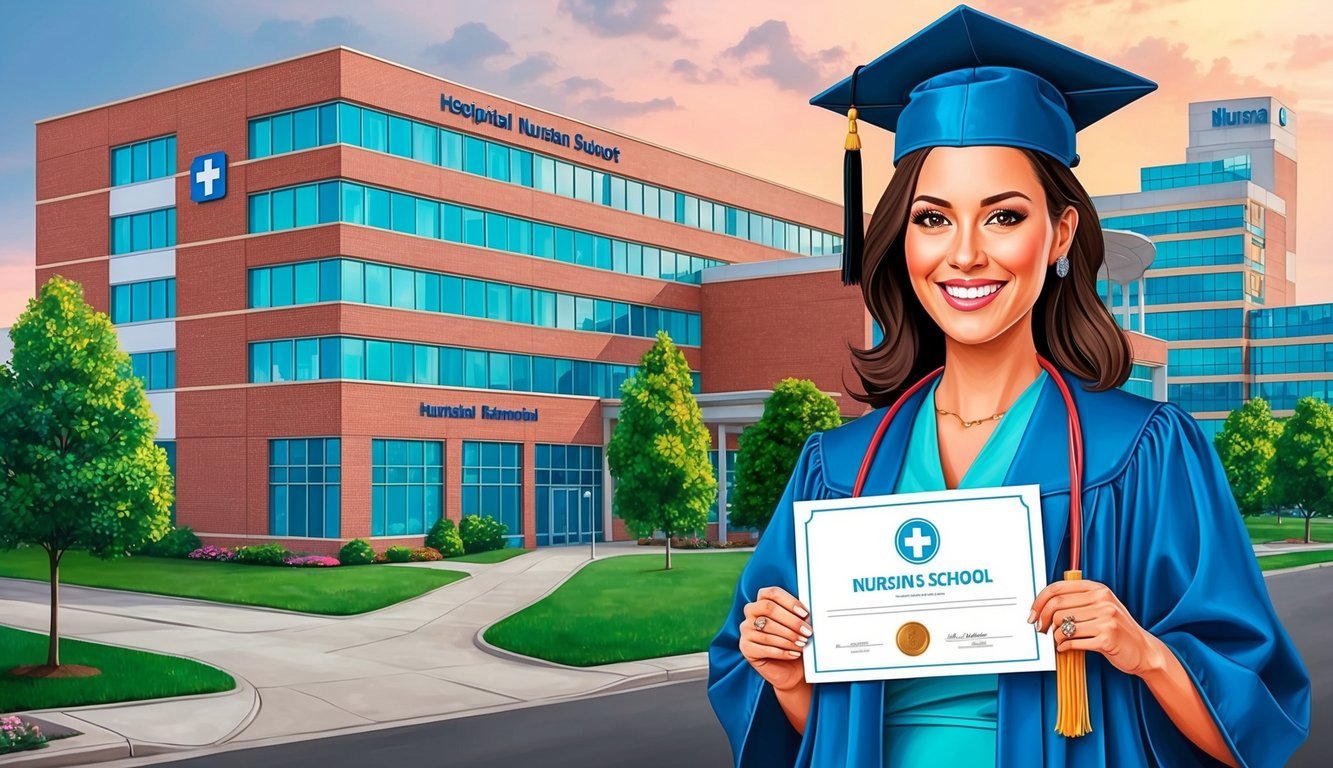As you explore your options for nursing education, Missouri offers a range of opportunities to advance your career in healthcare.
The state is home to several nursing schools that provide high-quality programs, preparing you for the challenges of the field. Choosing the right nursing program in Missouri can lead you to a fulfilling career and help address the ongoing nursing shortage.
In Missouri, nursing schools offer various degree options, including Associate Degree in Nursing (ADN), Bachelor of Science in Nursing (BSN), and advanced programs such as Master’s and Doctoral degrees.
These programs equip you with the knowledge and skills required to succeed.
Many institutions also focus on community engagement and research, further enhancing your learning experience.
Whether you are just starting your journey in nursing or looking to further your education, Missouri’s nursing schools provide robust programs that cater to your career aspirations.
By exploring the various options available, you can find a nursing program that aligns with your goals and prepares you for a successful career in healthcare.
Overview of Nursing Education in Missouri
Nursing education in Missouri offers diverse programs catering to various career paths, from entry-level nursing to advanced practice roles.
You can find a range of degrees, including associate, bachelor’s, master’s, and doctorate options.
These programs are designed to prepare you for successful careers in the healthcare industry.
Nursing Programs and Degrees Offered
Missouri provides a variety of nursing programs to suit your educational needs.
Here’s an overview of the main degrees available:
| Degree Level | Description |
|---|---|
| Associate Degree in Nursing (ADN) | Typically a two-year program focusing on fundamental nursing skills. Prepares you for entry-level roles. |
| Bachelor of Science in Nursing (BSN) | A four-year degree offering in-depth nursing education, critical thinking, and leadership training. It enhances job prospects significantly. |
| Master of Science in Nursing (MSN) | Designed for RNs seeking advanced practice roles or leadership positions. Programs often require a BSN. |
| Doctor of Nursing Practice (DNP) | This terminal degree focuses on clinical practice and leadership. Prepares you for roles in administration and education. |
You can explore various BSN programs in Missouri and MSN programs in Missouri that meet your career goals.
Each program emphasizes essential competencies and clinical experience, ensuring you are well-equipped to serve patients effectively.
Top Nursing Schools in Missouri
Missouri offers a variety of nursing programs that cater to different educational needs and career aspirations.
Some institutions stand out due to their robust programs, specialized focuses, and overall reputations.
Here’s an overview of the leading nursing schools in the state.
Comparison of Leading Institutions
Below is a comparison of some notable nursing schools in Missouri based on key factors like NCLEX pass rates, program types, and accreditation:
| University/School | NCLEX Pass Rate (%) | Degrees Offered | Accreditation |
|---|---|---|---|
| University of Missouri | 90% | BSN, MSN | CCNE |
| Goldfarb School of Nursing | 96% | ADN, BSN, MSN | ACEN |
| Maryville University | 95% | BSN, MSN | CCNE |
| Southeast Missouri State University | 89% | BSN | ACEN |
| College of the Ozarks | 91% | BSN | ACEN |
This table highlights the strengths of each school, making it easier for you to evaluate your options.
University Highlight: University of Missouri
The University of Missouri is a research-focused institution with a highly regarded nursing program.
Its College of Nursing offers both undergraduate and graduate degrees that prepare students for diverse nursing careers.
The BSN program is notably rigorous, emphasizing clinical practice and community health.
A unique feature is the Doctor of Nursing Practice (DNP) program, which aims to develop advanced practice nurses who can lead healthcare reforms.
With a high NCLEX pass rate of around 90%, graduates are well-equipped to enter the workforce.
This school also offers scholarships specifically for nursing students, making it financially accessible.
For more details, visit the University of Missouri Nursing.
Specialized Program Focus: Goldfarb School of Nursing
Goldfarb School of Nursing, affiliated with Barnes-Jewish Hospital, stands out for its hands-on training and specialized programs.
The school offers accelerated BSN programs designed for individuals holding a bachelor’s degree in another field.
The NCLEX pass rate is impressive at 96%, and the curriculum is designed to integrate clinical experiences with theoretical knowledge.
Moreover, Goldfarb offers a Master’s degree with a focus on leadership in nursing, preparing graduates for administrative roles in healthcare.
Goldfarb also has partnerships with various healthcare facilities, providing students with rich opportunities for clinical placements.
Check out more on the Goldfarb School of Nursing.
Liberal Arts Perspective: College of the Ozarks
College of the Ozarks combines nursing education with a strong liberal arts foundation.
Known as “Hard Work U,” the school emphasizes a work-study program that allows students to reduce their tuition costs while gaining valuable experience.
The BSN program includes a curriculum that is both comprehensive and accessible.
The college prides itself on producing well-rounded graduates who not only excel in clinical skills but also in critical thinking and ethical reasoning.
With an NCLEX pass rate of 91%, students are prepared to succeed in the nursing profession.
The college’s unique model enhances the overall educational experience, making it an attractive option for those looking for a holistic approach.
More information can be found at the College of the Ozarks Nursing.
Admissions and Program Requirements

Navigating the admissions process for nursing schools in Missouri requires a solid understanding of application requirements and timelines.
You also need to be aware of the significance of NCLEX-RN pass rates, which can impact your career and program choice.
Application Process and Deadlines
The application process typically begins with submitting an application form along with your transcripts, letters of recommendation, and a personal statement.
Most programs require a minimum cumulative GPA, often around 2.8 or higher.
Here are some common application components:
- Official Transcripts
- Personal Statement
- Letters of Recommendation
- Resumé or Curriculum Vitae
Admission deadlines can vary, but many programs operate on a fall semester entry.
It’s crucial to check specific schools for their dates.
For example, some institutions may have deadlines as early as January for fall admission.
Staying organized will help ensure you submit your application on time.
NCLEX-RN Pass Rates and Importance
The NCLEX-RN exam is a critical milestone for nursing graduates, serving as a licensure requirement.
High pass rates at your chosen nursing school can indicate the quality of education and preparedness you will receive.
For instance, institutions such as State Fair Community College boast impressive success rates, often around 98%.
| Nursing School | NCLEX-RN Pass Rate |
|---|---|
| State Fair Community College | 98% |
| University of Missouri | 90% |
| Other Notable Schools | 85%-95% |
Understanding these rates helps you assess a program’s effectiveness.
A strong NCLEX pass rate often correlates with robust support services and effective curricula, making it a significant factor in your decision-making.
For more detailed information, you can visit Nurse.org.
Licensure and Career Pathways in Nursing

Navigating licensure and career pathways in nursing is essential for your professional development.
Understanding the requirements for licensure and the options available for advancing your education can significantly influence your career trajectory.
Nursing Licensure Explained
To practice as a nurse in Missouri, you must obtain a nursing license.
This process begins with completing an accredited nursing program, whether it’s an Associate Degree in Nursing (ADN) or a Bachelor of Science in Nursing (BSN).
After graduation, you must pass the NCLEX-RN exam.
The passing rates for BSN students in Missouri range from 72.02% to 100.00%, while ADN students have rates between 76.34% and 99.26%.
Once you pass the exam, you will apply for your nursing license through the Missouri State Board of Nursing.
Ensuring that you meet all following maintenance requirements is crucial, including ongoing education and renewal applications.
Advancing from RN to BSN
For registered nurses (RNs) looking to advance their careers, enrolling in an RN to BSN program in Missouri offers numerous advantages.
Many schools offer online options, allowing flexibility to balance your current job with your studies.
Such programs typically build on your existing knowledge while exploring advanced nursing concepts, leadership, and patient care management.
This added educational experience can open doors to management and specialized positions.
Completion time may vary, but many programs can be finished in one to two years.
Schools like the University of Missouri-Kansas City provide multiple pathways to achieve this goal, fostering professional growth and better job opportunities.
Career Prospects for Nursing Graduates
The career prospects for nursing graduates in Missouri are promising.
According to the state, the demand for registered nurses continues to grow, making the profession stable and rewarding.
As a nursing graduate, you can work in various settings, including hospitals, clinics, and community health organizations.
The average annual salary for RNs in Missouri is around $67,790.
Specializations, such as critical care or pediatrics, can lead to higher salaries and advancement opportunities.
Graduating from recognized programs can further enhance job prospects, as employers often prefer candidates from accredited schools.
Support and Resources for Nursing Students

Nursing students in Missouri have access to a variety of vital resources designed to support their educational journey.
These include financial aid options to ease the burden of tuition costs and opportunities to connect with peers through organizations and networks.
Financial Aid and Scholarships
Navigating financial aid can be crucial for nursing students.
Many options are available, including federal grants, student loans, and nursing-specific scholarships.
| Type of Aid | Description |
|---|---|
| Federal Grants | Need-based financial assistance that doesn’t require repayment. |
| Student Loans | Borrowed funds that must be repaid after graduation. |
| Nursing-Specific Scholarships | Scholarships offered through various organizations, focusing on nursing students. |
You can find nursing scholarships tailored to different demographics, including veterans and minorities.
Additionally, RN to BSN programs often have financial aid options.
Check with the Missouri Board of Nursing for approved financial programs to support your studies.
Student Organizations and Networks
Participating in student organizations can enhance your nursing education experience. Missouri nursing schools offer a range of groups aimed at fostering professional connections and community service.
| Organization | Purpose |
|---|---|
| Student Nursing Organization (SNO) | Provides support and outreach projects for nursing students. |
| Missouri Nursing Students’ Association | Offers resources and advocacy for nursing students throughout the state. |
These organizations not only help you connect with others but also provide academic support and networking opportunities.
Engaging with these networks can significantly enrich your educational and professional experience.

